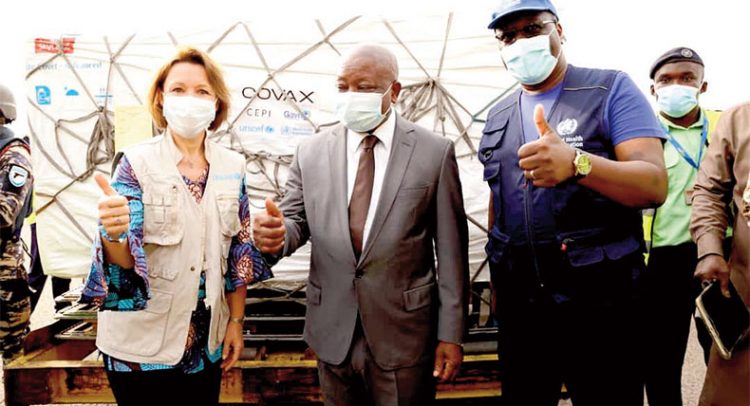From left: Anne-Claire Dufay, Kwaku Agyeman-Manu and Dr. Francis Kasolo after taking delivery of the Covid-19 Vaccine
Ghana yesterday took delivery of 600,000 doses of the Covid-19 vaccines at the Kotoka International Airport (KIA), an occasion described as momentous by both the World Health Organisation (WHO) and the United Nations Children’s Emergency Fund (UNICEF) in a joint statement.
The first doses of the AstraZeneca Coronavirus vaccine acquired under the Covid-19 Vaccine Global Access (COVAX) Facility of the WHO, attracted prime time mention on international media – BBC and Al Jazeera.
The live coverage accorded the momentous occasion, underscoring the importance of the arrival of the vaccine which came at a time the country was witnessing a spike in deaths related to Covid-19.
Even before the touchdown of the vaccine-carrying aircraft, the anxiety among Ghanaians was electric—some of them wondering whether indeed the President’s word of acquiring a vaccine would come to pass.
he Minister-designate for Health, Kwaku Agyeman-Manu, led the government’s delegation to receive the first consignment of the vaccine produced by the Serum Institute of India (covishield) at KIA.
Ghana becomes the first African country under the COVAX Facility to take delivery of the first consignment of the vaccines.
Beneficiaries
Health authorities, prior to the shipment of the vaccine, have stated at a stakeholder engagement on the vaccine rollout that the first segment of the population to benefit from the 600,000 doses will be health workers, adults 60 years and over and people with underlying health conditions.
Other beneficiaries included frontline executive, legislature, judiciary and related staff, frontline security personnel, some religious leaders, essential workers, teachers and other personalities in Greater Accra Metro, including Awutu Senya West and Awutu Senya East in the Central Region.
A similar segmented population in the Greater Kumasi Metro and Obuasi Municipality, health authorities said, would also be covered in the initial vaccine rollout.
It said from March 2, 2021, the Covid-19 vaccines will be deployed in health facilities and designated centres in these geographical regions.
Scientist at the West African Centre for Cell Biology of Infectious Pathogens (WACCBIP), Dr. Yaw Bediako, has said the vaccine was safe and that it would take 21 days after administering for an individual to become immune to Covid-19.
UN Statement
The UN agencies in the country, including UNICEF Representative in Ghana, Anne-Claire Dufay, and WHO Representative to Ghana, Dr. Francis Kasolo, have expressed delight at the arrival of the first Covid-19 vaccine in the country.
“This is a momentous occasion, as the arrival of the Covid-19 vaccines into Ghana is critical in bringing the pandemic to an end. The only way out of this crisis is to ensure that vaccinations are available for all. We thank all partners that are supporting the COVAX Facility to deliver safe and effective Covid-19 vaccines to all countries quickly and fairly,” the joint statement said.
They indicated that the shipments also represented the beginning of what should be the largest vaccine procurement and supply operation in history.
The COVAX Facility plans to deliver close to two billion doses of Covid-19 vaccines this year, which is an unprecedented global effort to make sure all citizens have access to vaccines.
“We are pleased that Ghana has become the first country to receive the Covid-19 vaccines from the COVAX Facility. We congratulate the Government of Ghana, especially the Ministry of Health, Ghana Health Service and Ministry of Information, for its relentless efforts to protect the population. As part of the UN Country Team in Ghana, UNICEF and WHO reiterate its commitment to support the vaccination campaign and contain the spread of the virus in close cooperation with all partners, including Gavi and the Coalition for Epidemic Preparedness Innovations (CEPI).
“Vaccines save lives. As health workers and other front-line staff are vaccinated, we will be able to gradually see a return to normalcy, including better access to health, education and protection services. In the spirit of Universal Health Coverage, let us leave no one behind,” the statement said.
By Jamila Akweley Okertchiri


